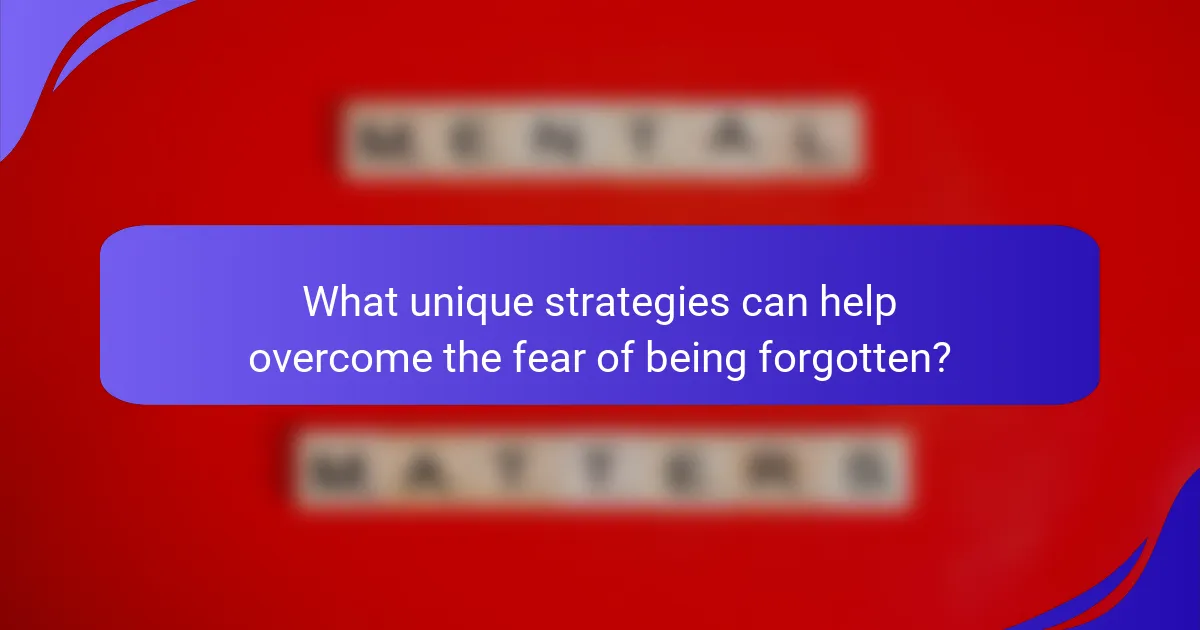The fear of being forgotten can significantly impede your fitness journey by fostering anxiety and self-doubt. This article explores how to overcome mental barriers by focusing on personal achievements, building a supportive community, and setting measurable goals. It also discusses unconventional methods like storytelling and mindfulness to enhance resilience. By addressing these fears, you can maintain peak fitness and overall well-being.

What is the fear of being forgotten in the context of fitness?
The fear of being forgotten can hinder fitness progress by creating anxiety and self-doubt. This mental barrier leads individuals to avoid commitment to fitness goals, fearing that their efforts will go unrecognized. Overcoming this fear involves focusing on personal achievements rather than external validation. Setting measurable goals and tracking progress can help individuals build confidence and reinforce their commitment to fitness. Developing a supportive community can also alleviate feelings of isolation, making it easier to stay motivated and engaged in health pursuits.
How does this fear impact men’s mental health?
Fear of being forgotten can significantly harm men’s mental health by fostering anxiety and depression. This fear often leads to social withdrawal, negatively impacting relationships and self-esteem. Men may experience heightened stress levels, which can manifest as physical symptoms, including fatigue and insomnia. Addressing this fear through support networks and mental health resources is crucial for achieving overall well-being. Engaging in fitness activities can also provide a constructive outlet, enhancing mental resilience and reducing feelings of isolation.
What are common signs of this fear among men?
Common signs of fear of being forgotten among men include anxiety about social interactions, excessive self-promotion, and withdrawal from relationships. This fear can manifest as an overwhelming need for validation, leading to unhealthy behaviors. Men may also experience feelings of inadequacy or depression when they perceive a lack of recognition. Addressing these signs is crucial for overcoming mental barriers and achieving peak fitness and health.

What universal mental barriers hinder fitness progress?
Fear of being forgotten significantly hinders fitness progress by creating anxiety and self-doubt. This fear can lead to avoidance of social settings, impacting motivation and accountability. Individuals may struggle to maintain consistency in their fitness routines due to concerns about judgment or lack of support. Addressing this barrier involves fostering a supportive environment, setting realistic goals, and focusing on personal achievements rather than external validation. As a result, overcoming this fear can enhance commitment to fitness and overall well-being.
How do self-doubt and negative self-talk affect motivation?
Self-doubt and negative self-talk significantly undermine motivation by creating mental barriers. These barriers can lead to a lack of confidence, which diminishes the desire to pursue fitness and health goals. As a result, individuals may avoid challenges, fearing failure or judgment. This cycle can perpetuate feelings of inadequacy, further reducing motivation. Addressing these negative thoughts is crucial for overcoming obstacles and achieving peak fitness and health.
What role does societal pressure play in fitness perceptions?
Societal pressure significantly influences fitness perceptions by creating unrealistic standards. Individuals often feel compelled to conform to these ideals, which can lead to mental barriers in achieving peak fitness. For instance, social media amplifies these pressures, showcasing curated fitness journeys that may not reflect reality. As a result, many people may struggle with self-esteem and motivation, hindering their health goals. Addressing these pressures requires fostering a positive mindset and focusing on personal progress rather than external comparisons.

What unique strategies can help overcome the fear of being forgotten?
To overcome the fear of being forgotten, focus on building meaningful connections and establishing a legacy. Engage in community activities, share your knowledge, and create lasting memories with others. Document your experiences through writing or art to leave a tangible impact. Regularly reflect on your values and what you want to be remembered for, reinforcing your sense of purpose. Embrace vulnerability by expressing your feelings and encouraging open conversations, fostering deeper relationships.
How can setting personal fitness goals mitigate this fear?
Setting personal fitness goals can significantly reduce the fear of being forgotten by providing a sense of purpose and achievement. When individuals establish specific, measurable, attainable, relevant, and time-bound (SMART) fitness goals, they create a structured path toward personal growth. This process fosters self-confidence and resilience, allowing individuals to focus on their progress rather than external judgments. As a result, the act of striving for fitness milestones transforms negative thoughts into positive reinforcement, reinforcing one’s identity and presence in their community.
What are SMART goals and how do they apply?
SMART goals are specific, measurable, achievable, relevant, and time-bound objectives that help individuals overcome mental barriers to achieve peak fitness and health. By defining clear goals, individuals can focus their efforts, track progress, and maintain motivation. For instance, setting a goal to run a 5K in three months provides a concrete target. This specificity helps combat the fear of being forgotten by creating a sense of purpose and direction. As a result, individuals are more likely to push through mental challenges and reach their health and fitness aspirations.
What is the importance of social support in overcoming this fear?
Social support is crucial in overcoming the fear of being forgotten, as it fosters resilience and motivation. Emotional backing from friends and family can alleviate feelings of isolation, enabling individuals to focus on their fitness and health goals. Studies show that social connections enhance mental well-being, leading to improved adherence to fitness routines. Engaging with supportive communities can provide accountability and encouragement, reinforcing positive behaviors. This unique attribute of social support significantly influences mental barriers, allowing individuals to achieve peak fitness and health.
How can accountability partners enhance commitment?
Accountability partners significantly enhance commitment by providing social support and motivation. They create a sense of responsibility, making individuals less likely to abandon their fitness goals. This partnership can lead to more consistent workout schedules and healthier lifestyle choices. Moreover, sharing progress with an accountability partner fosters positive reinforcement, which can diminish the fear of being forgotten and strengthen dedication to achieving peak fitness and health.

What rare approaches can lead to breakthroughs in mental barriers?
Embracing unconventional methods can significantly break through the fear of being forgotten. One rare approach is engaging in storytelling, which allows individuals to connect deeply with their experiences and share them, fostering a sense of legacy. Another method involves practicing mindfulness meditation, which can reduce anxiety about being forgotten and enhance focus on present fitness goals. Additionally, utilizing creative expression, such as art or writing, can help articulate feelings and transform mental barriers into motivational fuel. These strategies not only address the fear but also promote resilience and peak performance in fitness and health.
How can mindfulness practices specifically aid in fitness motivation?
Mindfulness practices enhance fitness motivation by fostering mental resilience and focus. These techniques reduce anxiety and self-doubt, enabling individuals to push through barriers. Regular mindfulness exercises, such as meditation and deep breathing, increase awareness of physical sensations and emotional states, promoting a positive mindset towards fitness. As a result, practitioners often experience improved consistency in their workout routines and greater enjoyment in physical activities.
What unconventional methods have proven effective for other men?
Unconventional methods that have proven effective for overcoming the fear of being forgotten include visualization techniques, community engagement, and personal storytelling. Visualization helps men see their fitness goals clearly, reducing mental barriers. Community engagement fosters accountability and support, enhancing motivation. Personal storytelling allows men to connect their fitness journey with their identity, reinforcing commitment. These strategies address unique attributes of mental barriers, promoting peak fitness and health.

What are the best practices for maintaining peak fitness while addressing mental barriers?
To maintain peak fitness while overcoming mental barriers, focus on setting realistic goals and practicing mindfulness. Establish a routine that incorporates physical activity and mental wellness techniques. Regularly assess progress to stay motivated and adjust goals as needed. Engage in positive self-talk to combat fears of inadequacy. Seeking support from fitness communities can also enhance accountability and provide encouragement.
How can regular reflection on personal achievements boost confidence?
Regular reflection on personal achievements significantly boosts confidence by reinforcing a positive self-image. Acknowledging progress helps individuals recognize their capabilities, making them more resilient against self-doubt. This practice fosters a growth mindset, encouraging continued effort and perseverance. As a result, individuals can overcome mental barriers that hinder their fitness and health goals. Regularly celebrating small victories cultivates motivation, ultimately leading to peak performance and well-being.
What common mistakes should men avoid when tackling these mental barriers?
To effectively tackle mental barriers, men should avoid common mistakes that hinder progress. These include neglecting self-reflection, underestimating the impact of negative self-talk, failing to set realistic goals, and not seeking support from others. Acknowledging these pitfalls can lead to better strategies for overcoming the fear of being forgotten and achieving peak fitness and health.
What expert insights can provide additional motivation and clarity?
Expert insights emphasize the importance of self-awareness and resilience in overcoming the fear of being forgotten. A study shows that individuals who embrace their unique fitness journeys are more motivated to achieve peak health. This approach fosters a strong sense of identity, reinforcing commitment to fitness goals. Additionally, engaging with supportive communities can enhance accountability, providing both motivation and clarity.



